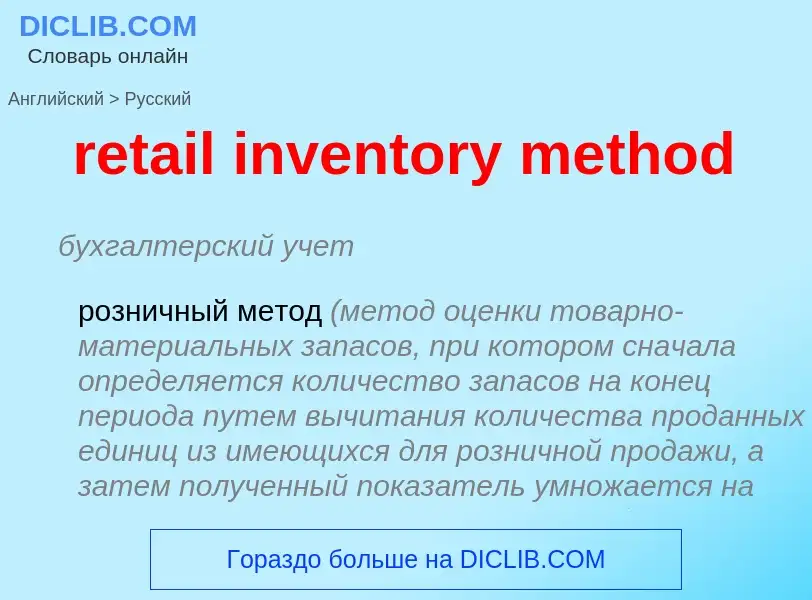Traduzione e analisi delle parole tramite l'intelligenza artificiale ChatGPT
In questa pagina puoi ottenere un'analisi dettagliata di una parola o frase, prodotta utilizzando la migliore tecnologia di intelligenza artificiale fino ad oggi:
- come viene usata la parola
- frequenza di utilizzo
- è usato più spesso nel discorso orale o scritto
- opzioni di traduzione delle parole
- esempi di utilizzo (varie frasi con traduzione)
- etimologia
retail inventory method - traduzione in Inglese
бухгалтерский учет
розничный метод (метод оценки товарно-материальных запасов, при котором сначала определяется количество запасов на конец периода путем вычитания количества проданных единиц из имеющихся для розничной продажи, а затем полученный показатель умножается на соотношение стоимости и розничной цены запасов; полученный в результате данных расчетов показатель представляет собой стоимость товарно-материальных запасов на конец периода)
синоним
2) розничное предприятие
Definizione
Wikipedia
Vendor-managed inventory (VMI) is an inventory management practice in which a supplier of goods, usually the manufacturer, is responsible for optimizing the inventory held by a distributor.
Under VMI, the retailer shares their inventory data with a vendor (sometimes called supplier) such that the vendor is the decision-maker who determines the order size, whereas in traditional inventory management, the retailer (sometimes called distributor or buyer) makes his or her own decisions regarding the order size. Thus, the vendor is responsible for the retailer's ordering cost, while the retailer usually acquires ownership of the stock and has to pay for their own holding cost. One supply chain management glossary identifies VMI as
The practice of retailers making suppliers responsible for determining order size and timing, usually based on receipt of retail POS and inventory data.
although a 2008 article notes that there is no standard definition of VMI and the term's usage varies "significantly" among companies supporting VMI processes.
A third-party logistics provider may also be involved to help ensure that the buyer has the required level of inventory by adjusting the demand and supply gaps.


![Department stores, such as [[Le Bon Marché]] of France, appeared from the mid nineteenth century Department stores, such as [[Le Bon Marché]] of France, appeared from the mid nineteenth century](https://commons.wikimedia.org/wiki/Special:FilePath/AA446b copy.jpeg?width=200)



 (14593807460).jpg?width=200)
, au Palais-Royal, 1825.jpg?width=200)
![The retail servicescape includes the appearance, equipment, display space, retail counters, signage, layout and functionality of a retail outlet. Pictured: [[Harrods]] food court The retail servicescape includes the appearance, equipment, display space, retail counters, signage, layout and functionality of a retail outlet. Pictured: [[Harrods]] food court](https://commons.wikimedia.org/wiki/Special:FilePath/Harrods Food Department Halls (8473364801).jpg?width=200)

![A local store named "Luovon puoji" in the [[Hailuoto Island]], [[Finland]] A local store named "Luovon puoji" in the [[Hailuoto Island]], [[Finland]]](https://commons.wikimedia.org/wiki/Special:FilePath/Luovon puoji.jpg?width=200)


![Australia's [[Officeworks]] is a category killer, retailing everything for the home office or small commercial office; stationery, furniture, electronics, communications devices, copying, printing and photography services, coffee, tea and light snacks Australia's [[Officeworks]] is a category killer, retailing everything for the home office or small commercial office; stationery, furniture, electronics, communications devices, copying, printing and photography services, coffee, tea and light snacks](https://commons.wikimedia.org/wiki/Special:FilePath/Pfficeworks inside.jpg?width=200)




![Coop]], are cooperatives. Coop]], are cooperatives.](https://commons.wikimedia.org/wiki/Special:FilePath/Zuerich Migroshochhaus 5.jpg?width=200)
